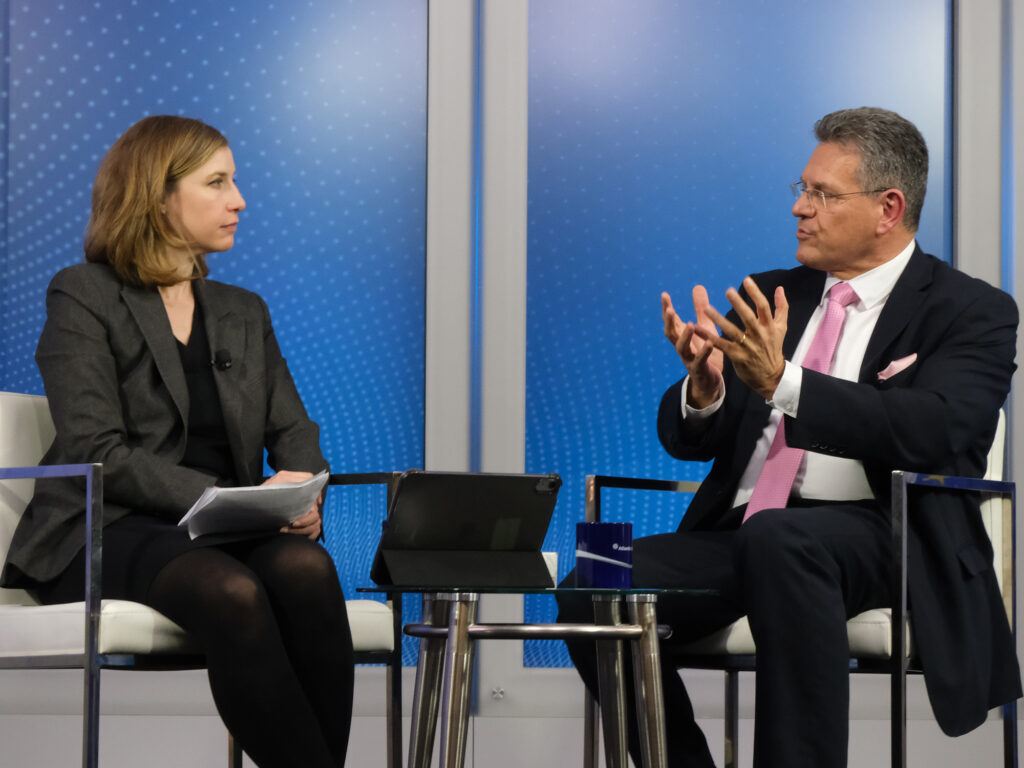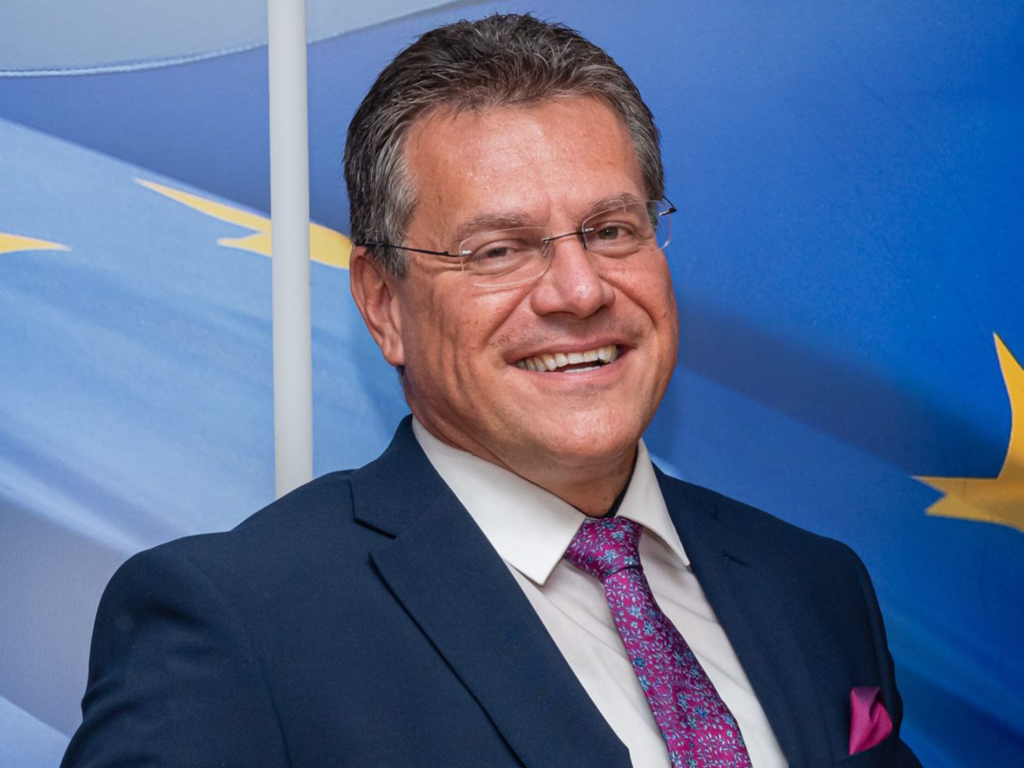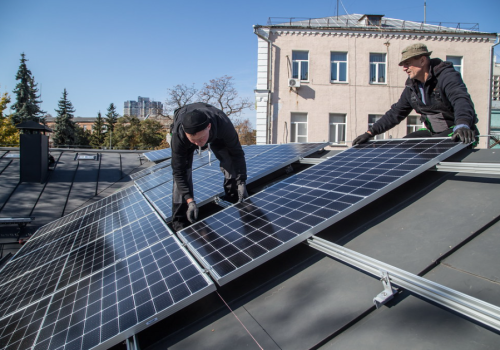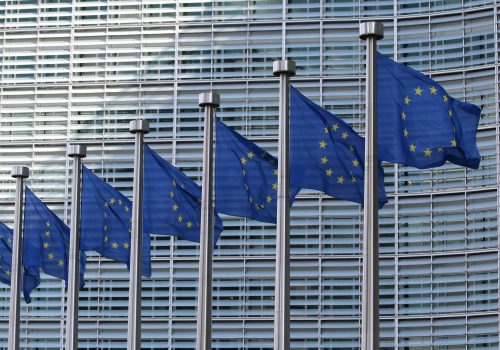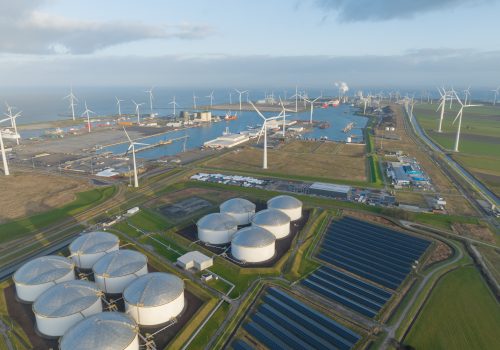Watch the full event
Last week, the European Commission released its newest climate targets, aiming to cut greenhouse-gas emissions by 90 percent by 2040, compared with 1990 levels. “We want to be climate neutral by 2050,” explained Maroš Šefčovič, executive vice-president of the European Commission for the European Green Deal. “But we know that without gas… it will not be possible for us.”
Šefčovič spoke at an Atlantic Council Front Page event Tuesday hosted by the Council’s Global Energy Center and Europe Center. There, he explained that liquefied natural gas (LNG) is “a very important transitional fuel,” but also in short supply in Europe, after the European Union (EU) began to shift away from Russian gas—imports from Russia declined from 150 billion cubic meters (bcm) in 2021 to just over 40 bcm in 2023. Imports from the United States increased from 19 bcm to 56 bcm.
Šefčovič—who is also the European Commission executive vice-president for interinstitutional relations and foresight—was in Washington, DC, this week to speak with Biden administration officials about a recent White House executive order that halted new approvals of LNG exports to countries that don’t have free trade agreements with the United States. “We had very good conversations on this topic yesterday,” Šefčovič said, adding that the US officials who attended the meeting were able to give him “reassurance” that in the next two to three years, “there should be no impact whatsoever on the supplies of US LNG to Europe.”
“What is expected anyways is that export capacity of the LNG would double between now and 2030,” Šefčovič added. “On top of it, there is a kind of emergency clause that if things will really go in the wrong direction, that there is a possibility to kind of adjust the measures.”
Below are more highlights from the event—moderated by New York Times reporter Ana Swanson—which touched upon US-EU cooperation on critical minerals, trade, and climate.
Cooperation on critical minerals
- Following the 2022 passage of the US Inflation Reduction Act, Šefčovič said that some projects (including projects focused on strengthening Europe’s battery manufacturing industry or building gigafactories) have “slowed down” or are being “transferred” to the United States.
- Šefčovič said he would welcome a US-EU agreement on critical minerals and would like to see cooperation result in a free trade agreement for the EU. He said that the EU and United States “understand each other” and have a similar philosophy on critical minerals, in that they want to make sure that any critical mineral project in another country creates added value for citizens there in the form of jobs, revenue, and more.
- With China dominating the extraction and processing of raw materials, Šefčovič said that the EU and United States need to “offer the better alternative.” The EU and United States, Šefčovič argued, “have [the] financial firepower to support these projects and to do it with this philosophy of sharing, not just extracting.” He argued that such critical minerals sharing could benefit Europe in the long run, since it is currently dependent on China and “we are concerned that any dependency could be weaponized.”
- Šefčovič also is bullish about a source of critical minerals (and low-carbon energy) closer to home: Ukraine. “To put it simply, I think Ukraine has everything we need,” he said. “I think [the EU and United States] can come together as part of our reconstruction efforts to kind of build this potential.”
A transatlantic green marketplace
- Šefčovič argued that “the next level of cooperation” between the United States and EU should be a transatlantic green tech market that not only permits free trade but also sets the stage for common standards, a shared vision on subsidies, and improvements in investment flows.
- Šefčovič said such a marketplace would allow the EU and United States to put their combined economic weight behind the development of new technologies, which would also benefit developing countries that need access to green technologies to mitigate and adapt to climate change. The “sooner we develop them… at scale so they are affordable, the better it would be for the planet,” Šefčovič said.
- “So I see this transatlantic marketplace as a recipe for making our cooperation even closer, stronger,” Šefčovič said, “[and] with a very positive impact.”
The United States’ inescapable responsibility
- The increase in US LNG exports to Europe as the bloc underwent its energy shift was “absolutely crucial”—despite the fact that the EU “paid a lot for it,” Šefčovič said. It had a “calming effect” that allowed EU countries time to “look for other supplies from other corners of the world” and to focus on how to deal with Russia’s invasion of Ukraine.
- Altogether, the EU’s energy shift, Šefčovič said, is a “pattern for the future, of what good allies should do [for] each other.”
- Šefčovič noted that the Biden administration’s executive order on new approvals on LNG exports, which was released last month, sent “ripples” around the world. That, he said, shows just how much the United States has become a “global guarantor of energy security,” and that Washington’s responsibility extends far beyond Europe—it also lies in developing countries across Southeast Asia, Africa, and Latin America. Cooperation on reducing carbon emissions in these countries “is very essential,” Šefčovič argued.
Katherine Walla is an associate director on the editorial team at the Atlantic Council.
Watch the full event
Further reading
Thu, Dec 7, 2023
Energy security as the foundation for Ukraine’s formula for peace
European Energy Security By
Rebuilding Ukraine’s energy sector in line with the world’s best practices in sustainable development and decarbonization will help to finally break the grip of the fossil fuel dictatorship and strengthen the new energy model of the world.
Thu, Nov 30, 2023
Europe needs a Green Deal that can meet the moment
Global Energy Agenda By Michał Kurtyka
Europe risks being left behind if it does not take swift action to ensure its energy future is “Made in Europe” where necessary, and “Made with Europe” where possible.
Thu, Nov 30, 2023
The 2024 Global Energy Agenda
Global Energy Agenda By
The fourth edition of the Global Energy Agenda kicks off with a collection of essays by energy leaders that are rolling out during COP28. Rounding out the Agenda in early 2024, the Atlantic Council Global Energy Center will release the results of its annual survey of experts that takes the pulse on the geopolitical risks affecting energy markets, the future of fossil fuels, and the transition to clean energy.
